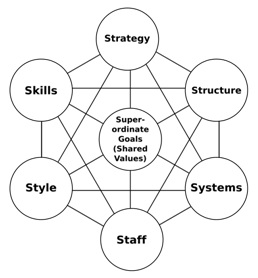|
 |
|
 |
|
|
||
Richard Pascale, Managing on the Edge (1990)
American management expert (pictured right) who was a professor at Stanford Business School in California.
See also... Richard Pascale in the Management Gurus section. Book summary An organization should constantly change how it does things through:
Why do successful companies fail?
1. Conservatism Sticking to what's made you successful, not radically changing.
2. Complacency and arrogance The decline of many of Peters and Waterman's excellent companies shows how success can easily turn into failure. So Pascale says in the book's first line: “Nothing fails like success”.
3. Temporary business
fads Frequent but only partial implementation of business fads like total quality management.
4. Little learning Failure to face reality, learn and continuously improve.
How do you achieve organizational renewal and success? 1. Fit All the 7 S’s (pictured right) should be:
This requires:
2. Split Encouraging autonomy through responsibility given to business units and teams.
3. Contend Encouraging constructive debate through combining different employees and managerial functions.
4. Transcend Managers continually creating new paradigms (new ways of thinking) that make continual organizational renewal a way of life.
What's so great about Honda? Honda, the Japanese motor manufacturer, has achieved all four (above) by managing to
achieve harmony within discord (creative conflict geared towards the common purpose of customer
satisfaction). Honda worried that too much fit (or harmony) would harm creativity by producing:
So it split the organization up into three companies (including research and development and engineering) which were independently run but inspired by the same customer driven purpose.
Key quotes on business success and change Nothing fails like success (the book’s first sentence). Inquiry is the engine of vitality and self-renewal. Renewal is a never-ending struggle.
Key quote on learning Continual learning is synonymous with self-renewal.
Key quote on management The ultimate, and largely ignored, task of management is one of creating and breaking paradigms.
Key quote on creativity Creativity and adaptation are born of tension, passion and conflict.
|
|
|
||
|
|
||
| Copyright © wisdomtowin.com 2025 All Rights Reserved | ||
|









